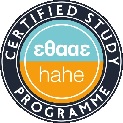Study Guide and Academic Regulations
The comprehensive Study Guide with university information and detailed course outlines is available here.
The most essential issues that concern the daily operations and processes of the academic program are provided here, in the “Student Guide to Operations and Processes”. Please note that this document does not have the formal status of the Study Guide.
The Program Regulation (Government Gazette 6041/19-10-2023) of the MBA International, concerning the Program’s re-established (Government Gazette 3841/06-09-2018) and as it has been replaced by the Government Gazette 4105/25-06-2024.
(available only in Greek)
Electronic Services Support
In case you experience a problem with a digital service, please consult this link to address the appropriate support.
(available only in Greek)
Administration
The i-MBA is administered by the Program Committee, according to the regulations for post graduate studies of the Program and of the University. The Committee is assisted by the Program Director, Deputy Director and the Program Administrative Personnel (Program Management, Career Development, International Relations, Marketing and Financial Affairs).
Academic Ethics
Students are expected to distinguish themselves for their ethos, integrity and spotless behavior during their studies in the Program. The students are expected to adhere to high ethical standards, which will be guaranteed by the Program Director and the Program Committee. Depending on the seriousness of the situation, the AUEB reserves the right to terminate one’s status as a student.
Students are also expected to participate in activities promoting social responsibility value and the principles of the Global Compact of which the MBA program is a part of.
Attendance
Course attendance in the MBA International program is obligatory. Student attendance is monitored by the program secretariat. Students are also required to arrive timely, so as not to disturb the class. Under no circumstances should a student miss more than two class sessions in a course. If a student does not take the scheduled exams at the end of a term, he/she can take the exam during the September re-examination period. If the same exam is not taken even in September re-examination period, the course must be attended again.
Courses and Scheduling
Core courses account for 28 or 32 contact hours. Electives are 28 contact hours. All courses are offered in the English.
The complete course schedule is available at the beginning of each academic year. Even though every effort is made to avoid changes in the course schedule, some changes might have to take place during the year. Courses are scheduled Monday to Friday in the time zone 14:00 – 18:00 for the Full-Time Program with electives running until 21.30 and in the time zone 18:00 – 21:30 for the Part-Time Program. Lectures might run also on Saturdays between 9:00 – 15:00.
Students are requested to make their elective course selections through the Admin Portal as early as possible after the start of the first semester. Some electives have a maximum number of attendants for pedagogical or technical reasons. Thus, as the Program cannot guarantee a place for all students in all electives, early registration is strongly advised. Conversely, if an elective is selected by a very small number of students, the Program reserves the right to cancel the specific course in accordance with the university regulations.
Course Requirements and Grades
Course requirements typically include individual and/or team-based exercises, assignments and case studies, class participation, business games and/or written final exam. The requirements for each course are presented in the Study Guide and by the instructor at the beginning of the course. At the end of every academic period, the student receives a final grade for each course. The grading scale is as follows:
8.51 – 10.00 = excellent (honors)
6.51 – 8.50 = very good
5.00 – 6.50 = good
0 – 4.99 = fail (F)
Any grade below five (5) is given when the student’s performance in any of the evaluation elements of a course does not qualify for a passing grade. Students who fail in an exam or assignment must take the course exam during the September re-examination period, and/or complete or resubmit all other evaluation elements by the same date.
Any re-examined or re-submitted evaluation element can only obtain the lowest passing grade of the normal examination period. Note that to obtain a passing grade for the course, all evaluation elements must be completed, and the minimum grade must be 5/10 in all.
Students who fail to attend an examination, are also re-examined in that course in the re-examination period and will be graded as follows:
(a) Having submitted the required justifying documents, his/her grade will not be affected.
(b) Not having submitted the required justifying documents, the grade will be affected as follows:
(i) you receive the lowest passing grade of the course in the normal examination period if your grade is higher than that.
(ii) you receive the grade of your re-exam if it is similar to or lower than the lowest passing grade of the course in the normal examination period.
Students are not allowed to fail in more than three (3) courses in each academic year.
If a student fails a course, he/she has already attended twice, he/she is automatically disqualified and cannot continue the Program.
Once a passing grade has been obtained by a student, it cannot be modified by any means.
At the end of each teaching period, the student may receive a detailed statement of his/her grades for all the courses they attended during the corresponding period.

















